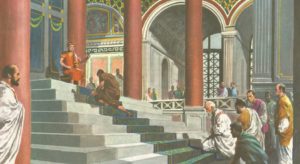[Greek] ἐπισκέπτομαι (episkeptomai), [Latin] visitare, [Latin] considerare, [French] examiner: to go to see, to be concerned, to visit, to look upon, to examine with the eyes, to inspect, to render assistance, to be present, to take care of, to seek out, to help, to look out for, to select carefully; Act.6:3, Mt.25:43, Act7:23, Act.15:36, Mt.25:36, Act.14:14, Heb.2:6, Jas.1:27, Lk.1:68, Lk.7:8, Lk.17:16

The Emperor Diocletian watches over and demands obedience from his subjects
Background Information:
Hellenistic Greek culture: This term is used in several ways in showing concern as authority figures, reflecting on something, and visiting people. A king looks upon and shows concern for his subjects. The gods and deities watch over and protect the people. Reflecting may include examining one’s character or investigating documents. Visiting may include doctors visiting patients or others ministering to friends.
Old Testament: This term is used in the sense of to visit, to look upon, to investigate, to be concerned about, to find out about something, to account for, and to be absent. Visiting the sick and the sheltering of strangers become important Rabbinic values. When God becomes the subject matter, this term takes on a profoundly religious sense. Throughout salvation history, God intervenes into the lives of His people, bestowing His will, blessings, and judgment. In addition, this term takes on the sense of to appoint someone in authority. This idea plays a significant role in the installation of leaders in the early Christian Church.
New Testament: Jesus highly stresses and values the Rabbinic notion of visiting the sick and caring for the less fortunate. Jesus states that this must be a fundamental attitude. Jesus claims man exists not just for himself, but for others, whom God is present in them. This helps to shed some light on why Jesus had said what is done or not done to the least of His brethren is done or not done to Him. This term also illustrates the sense that Moses and Paul show concern and responsibility for their followers. This is similar to the idea of the good shepherd caring for his flock. The New Testament continues the Old Testament tradition of appointing leaders in an office of authority to lead the Christians. God’s intervention into human affairs comes through in the actions of Jesus. The New Testament shows how this extends to the Jewish Christians and Gentiles.
Scripture:
“Brothers, select from among you seven reputable men, filled with the Spirit and wisdom, whom we shall appoint to this task.” Act.6:3
The Hellenists complained that their widows were being neglected in the daily distribution. Provisions were made to create the office of a deacon to minister to the needs of the widows. This was done through the election of the members of the congregation.
“For I was hungry and you gave me food, I was thirsty and you gave me drink, a stranger and you gave me no welcome, naked and you have me no clothing, ill and in prison, and not minister to your needs?” Mt.25:42-43
This is one of Jesus’ most famous commands to help the less fortunate. Jesus says one must have the attitude of service towards others.
“Blessed be the Lord, the God of Israel, for He has visited and brought redemption to His people.” Lk.1:6
This idea continues the Old Testament theme of God intervening into the affairs of man. Jesus continues this role in the New Testament.
“Paul said to Barnabas, ‘Come, let us make a return visit to see how the brothers are getting on in all the cities where we proclaimed the Word of the Lord.” Act.15:36
As leaders of the Church, Paul and Barnabas, are concerned about the welfare of their congregation. Paul and Barnabas visit them.
Etymology: It was interesting to discover the nuanced meanings of this Latin verbs in reference of this term episkeptomai (to look over). This term pertains to person in authority who watch over others. The Latin verb visitare means to care for someone or to visit the sick. The Latin verb means to examine or to provide for.
Conclusion:
Episcopal, skeptic, skeptical, visit, visitation, consider, consideration, examine, examination
This term has a very important and rich meaning in history. Most of us are already aware that Jesus highly valued the importance of visiting the sick and helping the less unfortunate. It is interesting to note that this single term conveys this important value. I did not realize that this was originally an important Rabbinic ethical value. Instead, we know from scripture of the Jewish prohibitions against touching an unclean or diseased person.
At first glance, the word skeptic doesn’t look like it should be related to this term episkeptomai. However, there is no question that these words are related. The Skeptics were an ancient Greek school that doubted the possibility of real knowledge. Originally a skeptic was one who questions what he sees. This word later takes on the sense of one with a doubting attitude in 1610.
